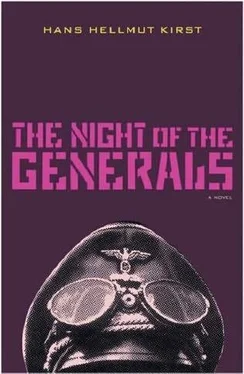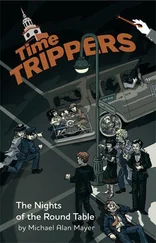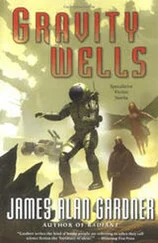“Even that doesn’t prove anything.”
“True, even that,” Müller-Meidrich conceded blandly. “But Berlin is a city of boundless possibilities. That’s why it’s not surprising that the two men have turned up again. We arrested them a quarter of an hour ago. They’re keeping mum for the moment, but something tells me that they belong east of the border. What shall we do with them?”
“Put them on ice temporarily,” Prévert suggested. “We’ll thaw them out when the time comes.”
“And until then?”
“Let them cool their heels.”
“Any other suggestions?”
“Yes, my dear Herr Müller-Meidrich. Play the innocent—telephone the Hotel am Kurfürstendamm and ask one of the guests, a man named Tanz, if he would like police protection. Tell him that two men, assumed to be from the Eastern Zone, have been trying to get at him.”
“Nothing else?”
“Nothing else. That will do for the time being.”
Frau Wilhelmine’s meticulously planned reception in the Green Salon of the Hotel am Kurfürstendamm promised to be asuccès fou. The guests were greeted with American-style martinis—high-proof gin with a dash of vermouth—which coursed down their throats like liquid fire and created an agreeably relaxed atmosphere. The ever-increasing hubbub of conversation seemed to indicate that a spirit of gregarious cordiality reigned.
The von Seydlitz-Gablers’ select little gathering had acquired rather larger proportions than they had originally intended. Almost everyone present knew everyone else. Innumerable encounters at similar functions, ostensibly held for political, cultural or professional reasons, had bred longstanding mutual familiarity. Names figured on certain lists, and their owners turned up because they wanted to keep them there. The only variable factor was the current celebrity: the circle round him remained almost unchanged.
Whether he was a cabinet minister, a film star, an international playboy, a sportsman or an American hotel magnate, the same figures always rotated round him.
This time the focal point of the gathering was a composite of General Tanz and General von Seydlitz-Gabler—the battle-scarred hero and the great strategist respectively. To those present, who regarded them as men who had helped to make history, they seemed to radiate an aura of spine-chilling grandeur.
Tanz stood there like a crag protruding from a blasted heath. His monolithic appearance evoked universal admiration and his steadfast silence was readily construed as profundity.
“He looks like an eagle soaring above the prairie,” twittered the junior television announcer, spell-bound. “A man like a bottle of champagne,” breathed the recording star, melodiously, her bosom heaving like a stormy sea.
“Is it true what they say about him?” asked the wife or girl-friend of a senior liaison officer in the Federal Government. “Did he really build a wall out of frozen bodies during the Russian campaign?” She addressed the question to her hostess with a thrill of expectant horror.
“I couldn’t tell you,” replied Frau Wilhelmine. Her tone was noticeably cool.
The senior liaison officer hastily nudged his over-impulsive wife or girl-friend, aware that she had just broken an important taboo. For a considerable time now, it had been bad form to dwell on the horrors of war in case it weakened the spirit of self-defence. In a loud and convincing voice, he said: “My view has always been that we need the best men on our side. No stone should be left unturned in the case of General Tanz.”
Frau Wilhelmine rewarded the senior liaison officer with a grateful smile. His wife or girl-friend shot him an oblique glance, but he ignored her and raised his glass in the direction of their host.
Von Seydlitz-Gabler was busy playing Pythia to Tanz’s oracle. He was never at a loss for an answer and, what was more, his answers had the spurious validity of the printed word. His publisher beamed happily. The General certainly knew how to sell himself. In his mind’s eye he pictured serried rows of dust-jackets in bookshop windows and a high rating on the best-seller list.
“You ought to write your memoirs, too,” he told Tanz enthusiastically.
“Some men can write,” replied Tanz in measured tones, “others are destined to act. I belong to the latter category.”
“Talking about action,” said the managing director of the electrical engineering firm, “how would you like to join us, other things being equal?”
“I regret that I am not an expert in your field,” Tanz said majestically.
The managing director, who specialized in communications systems, smiled understandingly. He was familiar with the modesty of senior army men and appreciated its material value. The priceless importance of such people consisted in their automatic knowledge of the right contacts and their unerring sense of good form.
“A man can serve his country in’ a variety of ways,” said the managing director.
“Quite right! The main thing is to serve it,” boomed von Seydlitz-Gabler, who never neglected an opportunity to air what he considered to be one of his maxims.
“How are you feeling?” he asked Tanz.
“First-rate.” Tanz produced the word like a slot-machine ejecting a packet of cigarettes. The skin of his face looked taut and shiny.
“A really nice crowd, eh?”
“A nice crowd—really.”
At that moment the recording star gave a sudden screech. Someone had poured champagne down her cleavage. The offender was trying to apologize, but the recording star hooted like a siren and smote her bare wet bosom dramatically. Frau Wilhelmine bore down on the group like a life-boat.
“Every cake has to have a little icing,” said von Seydlitz-Gabler with laborious gaiety.
Tanz had gone deathly pale. His hands were clenched and his cheek-muscles rigid. He looked as if he were grinding his teeth in agony.
“Disgusting,” he said in a choked and almost inaudible voice. Then he pulled himself together with an effort. His lips twitched in a semblance of a smile. Kahlenberge was standing in front of him, and Kahlenberge was saying, indicating his companion: “May I introduce Herr Prévert?”
In the narrow ante-room leading into the Green Salon sat Wyzolla, who had installed himself, legs apart, in a chair near the door and was waiting. What he was waiting for, he didn’t know. He was merely carrying out his General’s orders and acting as a body-guard.
With him in the narrow ante-room was Hartmann, also waiting. He stood leaning motionless against the wall for some time, observing Wyzolla with interest. Prévert had drawn his attention to Tanz’s orderly and offered a few suggestions on how to handle him. The longer Hartmann watched Wyzolla, the more he succumbed to the strange sensation that he was looking at himself as he had been twelve years before.
“Does he still insist on having his shoes polished with three brushes and two dusters?”
Wyzolla sat up alertly. “Who?”
“Has he got used to glass ash-trays, or do they still have to be china?”
“What’s that got to do with you?” Wyzolla asked suspiciously.
“In my day he always wore night-shirts. They had to be white, not coloured. He couldn’t stand anything fancy. All the creases had to be ironed out beforehand, and there had to be a clean linen handkerchief in the right-hand breast-pocket—a small white one.”
“Man alive!” said Wyzolla, impressed. “How do you know all that?”
“I had your job once,” Hartmann told him. “It doesn’t seem so long ago, really, when I come to think of it.”
Wyzolla asked for information and Hartmann supplied it, soothing the alert young N. C. O’s. misgivings with an abundance of detail. Wyzolla began to thaw, and before long a highly animated conversation was in progress.
Читать дальше












